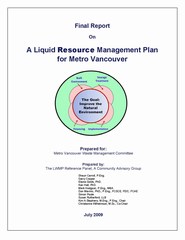Metro Vancouver Reference Panel recommends mandatory source control program for liquid wastes
Metro Vancouver Liquid Resource Management Plan
In their Final Report on A Liquid Resource Management Plan for Metro Vancouver, the Metro Vancouver Reference Panel wrote that:
“Decisions we make on the built environment have a direct impact on the health of the natural environment. Our recommendations speak to the need to become more consciously aware of this interconnection in our planning, regulation and decision-making.”
“The region can begin to protect the environment by preventing the introduction of endocrine disruptors as well as persistent bioaccumulating contaminants; and reduce sewer system costs by intercepting fats, oils and greases.”
“The total cost of allowing substances to become part of the sewage system – treatment, pipe maintenance and replacement, impacts of toxins in the environment – is far greater than investing in effective source control implementation- that is, save the region more in the long term.”
Reference Panel Recommendation:
The Reference Panel recommended that the region provide additional financial incentives, enforcement resources and automated monitoring technologies to ensure effective source control in the industrial-commercial-institutional sector, and ultimately in the residential sector too.
What a Mandatory Source Control Program Would Encompass
 “Fats, oils and grease (FOG) waste discharges from commercial establishments have significant impacts on the capacity and condition of the sanitary sewer collection system, and therefore have substantial cost implications over time,” states Garry Cooper, the member of the Reference Panel with FOG experience. He is General Manager, Organic Resource Management (BC) Inc.
“Fats, oils and grease (FOG) waste discharges from commercial establishments have significant impacts on the capacity and condition of the sanitary sewer collection system, and therefore have substantial cost implications over time,” states Garry Cooper, the member of the Reference Panel with FOG experience. He is General Manager, Organic Resource Management (BC) Inc.
According to Garry Cooper, the foregoing are drivers for a mandatory source control program that would encompass:
- Registration: All businesses that generate FOG would be required to register their grease traps and/or interceptors as part of the business licence process (for example, at an annual cost of $50 per trap/interceptor).
- Monitoring & Reporting: Each business would be connected to a central monitoring system. Each time a trap/interceptor is cleaned, the business owner and/or approved grease hauler would log into the online system to record the Grease, Water and Solid levels.The online system is much like that used by parcel delivery services. When the hauler cleans a trap, he would report via the online software at the time of pickup and disposal. In situations where business owners choose to do the cleaning themselves, they would have to provide proof of disposal via online reporting. This would ensure that they are not simply emptying the grease in the garbage or down a storm drain.
- Fee for Service: Each time a trap/interceptor is cleaned and reported online, there would be a $5 fee. This would fund the ongoing server and software upgrade costs.
- Enforcement: Trap/interceptor registration fees as part of the business licence would cover the cost of enforcement. The central monitoring system would provide enforcement officers with data on who is doing what, and this would enable enforcement officers to target their efforts. The data could also be used to trouble-shoot the sources of grease build-up problems in the sanitary sewer system.
“The technology exists. It is a matter of Metro Vancouver municipalities making the decision to mandate FOG source control,” concludes Garry Cooper.
What Other Regions are Doing
When the Reference Panel met with the Metro Vancouver Waste Management Committee in mid-June to present their Interim Report, the committee asked the Reference Panel to provide information on what other regions are doing.
“The incentive for preventing FOG from entering sanitary sewer systems is the avoided cost of sewer maintenance and/or replacement,” states Garry Cooper. He provided the following examples of enforcement approaches in the United States:
- Washington Suburban Sanitary Commission – All traps are inspected within 5 years by an enforcement officer. Every Food Service Establishment (FSE) is graded on a set of four criteria, and this grading establishes inspection frequencies, from twice annually for high priority facilities to once every two years for lower priority facilities.
- Los Angeles, California – Every trap is registered with the City; and must be cleaned by a licensed hauler at a frequency such that the combined depth of the FOG material and solids does not exceed 25% of the total liquid depth.
- Fort Worth, Texas – Every trap must obtain a permit prior to discharging to the municipal sewer; must be cleaned by a licensed hauler at a minimum of once every 90 days; and must be 100% pumped out. Enzymes, solvents and emulsifiers are strictly prohibited. Records must be kept for 5 years
- Dallas, Texas – Traps must be completely emptied and cleaned by a hauler licensed by the Texas Commission on Environmental Quality. They must be cleaned as often as necessary but not less than once every 90 days or whenever 25% or more of the interceptor contains floating materials, sediment, oils or grease.
- St. Petersburg, Florida – Traps must be pumped out every 30 days when there is garbage disposal on drains, and every 60 days if not.
“Most cities have established fines up to $10,000 for non-compliance. Some cities will disconnect the non-compliant business from the water and sewer systems. Other cities will both fine the business and back-charge the cost of sanitary sewer cleaning,” reports Garry Cooper.
Posted August 2009

